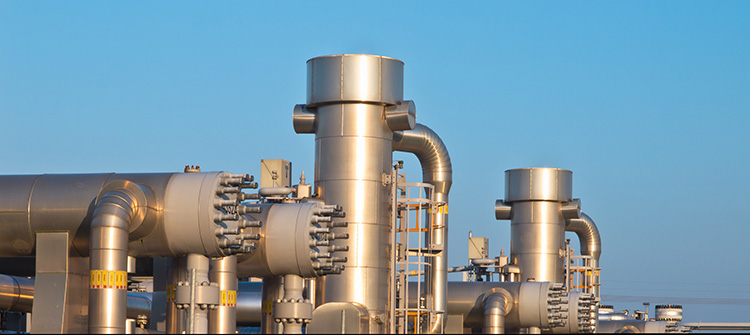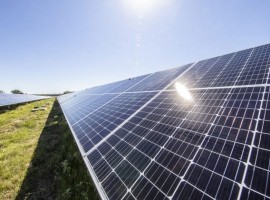By Sarah Samir
Not only known for its antiquities and for being an agricultural provider, Egypt was once known for its natural gas exports. The North African Country was exporting around 30% of its natural gas production in 2009 in the form of liquefied natural gas (LNG), according to the Gas Exporting Countries Forum (GECF)’s Egypt country profile. However, growing local demand has turned Egypt into a gas importer after years of natural gas boom.
To bring back the golden era, the Egyptian Ministry of Petroleum and Mineral Resources is working according to plans in order to reach natural gas self-sufficiency and eventually export natural gas once more, despite the ever growing natural gas consumption.
The Exporting Era
In 1997, Egypt made new natural gas discoveries in the Mediterranean deep water, which enabled the North African country to enter the gas game as a supplier, according to the Egyptian Ministry of Petroleum’s studies on natural gas exports. Therefore, the Egyptian oil and gas sector had to study the international natural gas market, as well as its production costs. It further had to restructure the oil and gas industry and establish infrastructure to prepare the sector for exporting.
In 2003, Egypt started exporting natural gas to Jordan and Israel. Accordingly, in the year of 2016, the nation established a pipeline passing across the Gulf of Aqaba in order to export its natural gas to the Jordanian kingdom, as Eric Schewe wrote in his article ‘How Natural Gas Works in Egypt’.
As an exporter, Egypt supplied natural gas to different markets using LNG facilities, making total of $3.2 billion earnings from natural gas exports by fiscal year 2007/2008, according to Daily News Egypt. The country counts with two LNG plants established close to its coasts: the SEGAS LNG plant and the IDKU LNG Plant, which enable the country to export LNG to global market.
Egypt Becomes LNG Importer
With the fast growing gas demand and the natural decline of fields’ production, Egypt had to stop supplying for the international market in order cover its local consumption. Since domestic production was not enough to fulfill the country’s needs, Egypt turned into a natural gas net importer in December 2012, a drastic change of status considered to be “due to the lack of improvement and development of gas wells in the last years,” as Process Engineer at the Egyptian Natural Gas Company (GASCO), Magdy Ahmed, told Egypt Oil & Gas.
“We received the first cargoes of LNG in April 2015, after equipping our ports and other facilities with the right infrastructure to receive them,” Minister of Petroleum and Mineral Resources, Tarek El Molla, said in an interview with BP Magazine. Molla further explained that Egypt suffered from a declining natural gas production for three years after the 2011 revolution, which led the country to take immediate temporary steps through natural gas importation.
In 2015 and 2016, the country’s production was not enough to meet the country’s demand. Egypt’s output recorded 2.715 million tons in 2015, while consumption made 3.037 million tons. In 2016, local natural gas supplies slightly increased to 2.85 million tons; yet, consumption also jumped to 3.396 million tons of natural gas, as mentioned at CAPMAS’ data.
In 2017, gas demand has continued to increase at rapid pace. Electricity generation from natural gas power plants have consumed alone 4 billion cubic feet per day (bcf/d) of the product during July 2017, which consists of an increase of around 8% from the 3.7 bcf/d of natural gas consumed in May 2017. Furthermore, the hike in demand at power stations reached 300 mcf/d in June and July due to the high temperature, the Ministry of Petroleum and Mineral Resources’ First Undersecretary for Gas Affairs, Mohamed Hassanien Radwan, told Amwal Al Ghad in July 2017.
Hikes in electricity production result in a great amount of gas usage, since the sector consumes 63% of Egypt’s overall natural gas demand, according to the latest report issued by the Egyptian Natural Gas Holding Company (EGAS).
Rising Production
Egypt succeeded to buy only 76.6% of the planned natural gas imports in fiscal year (FY) 2016/2017 as the country imported just 118 cargoes out of the 154 cargos previously expected, according to a press release by the ministry of petroleum.
This decrease came as the Egyptian natural gas production is increasing due to linking new discoveries to local output. In May 2017, BP announced the start of production from West Nile Delta Development, achieving first gas extraction eight months ahead of schedule. Egypt’s natural gas production started to stabilize as the state “signed more than 74 new or amended agreements in the last three years with different partners,” El Molla told BP.
During 2017, local output has continuously increased with a percentage that is higher than the natural gas consumption increase. In June 2017, Egypt produced 3.19 million tons, a year-on-year (y-o-y) hike of 26.5% from 2016’s 2.52 million tons. Meanwhile, Egyptian consumption rose to 3.69 million tons in June 2017 from 3.33 million tons in June 2016, a 10.8% y-o-y increase, according to CAPMAS. Additionally, the country is expected to start production from several new concessions, which will further boost output rates to cover local demand.
“Recently, Egypt has several discourses, such as Zohr Field, with reserves around 30 trillion cubic feet (tcf). It was announced that 81% of the work has been completed in Zohr by end of July, and the early production will start by end of 2017. Moreover, Egypt has the Atoll Field, which is located in East Nile Delta in North Damietta Offshore, with reserves of around 1.5 tcf; in addition to the North Alexandria concession, and the production from Giza and Fayoum field, which will start by the end of 2018,” Professor in Petroleum Engineering and Energy Advisor in the Committee of Energy in Egyptian Parliament, Tharwat Hassane, told Egypt Oil & Gas. “All these fields by end of 2018 will add significant value to Egypt’s natural gas production, which will enable Egypt to be one of the best of natural gas exporters to the whole world,” he added.
Egypt to Export Natural Gas
With bright prospects in natural gas output, the country should regain its position as natural gas exporter, especially because it already has the infrastructure required for exporting the product. Egypt is expected to start exporting natural gas during the second half of 2019, as the country is working to achieve its self-sufficiency target, Former Chairman of EGAS, Mohamed El Masry, disclosed in February 2017.
“With new discoveries and the new market regulatory law, there is a guarantee that Egypt will export natural gas,” Hassane pointed out. He further noted that, in order to achieve its export target, the government should “put a quick plan to complete all work for the new facilities for the new fields such as Zohr and North Alexandria, enhance the well productivity by work over operation and put more fields in the production, and start thinking about the unconventional resources.” Hassane added that the Egyptian oil and gas authorities should also “invest in more exploration areas, enhance and maintain the gas network facilities to take more natural gas capacities, and try to use the new gas market regulatory law very soon and start giving the new gas license to the investor.”
Yet, the state will still have to deal with some challenges in order to achieve its export plans. While Egyptian natural gas production is increasing, the government is adding new natural gas consumers to the local gas grid by adding households and commercial units to the grid. Furthermore, as the industrial sector is growing, huge factories are expected to be established and increase the local usage of natural gas.
“I expect that the Zohr field and other new discoveries under process will have a role in supplying local market’s needs and creating strategic reserves, then the surplus could be exported in order not to face the same problem we faced in 2010, when we opened the way for exports and were not able to commit due to the gap between consumption and production that might have led to the violation of international agreements.” Group CEO of Solid Capital, Mohamed Reda, stated to Egypt Oil & Gas. “I think Egypt could export after 2019 upon having more preparations to cover demand and secure reserves, and then it can start exporting the natural gas surplus,” he stressed.
Meanwhile, other experts believe that the probability of exporting gas by 2019 “will depend on the gas production from new discoveries and the capability of working companies to improve production,” as pointed out by Magdy Ahmed to Egypt Oil & Gas. “It will take some time more to export natural gas without effect the local consumers badly,” he added.
With Egypt exporting natural gas, the industry will attract more investments as the “international oil companies (IOCs) will benefit from natural gas surplus and exportation [in light of] the new gas market regulatory law, which allows the investors and the IOCs to sell the produced gas inside and outside of Egypt with good prices,” Hassane explained.
Eventually, exporting natural gas will boost the Egyptian economy as it will increase foreign currency reserves and raise foreign investments. “Gas market is a promising market to which most countries are heading; therefore, there is a possibility of increasing prices. This will have an effect on Egyptian economy, as the national economy has very few foreign currency sources. Hence, exporting natural gas will have a new source of foreign currency that adds to the foreign currency reserves, which will lead to currency stability,” Reda pointed out.
Egypt towards Regional Energy Hub
In light of the increasing natural gas production and the ministry’s aim to reach natural gas self-sufficiency, Egypt has adopted an ambitious vision. The country seeks to become a regional and global hub for energy generation, transmission, and distribution to Europe, especially to Germany, according to Egypt’s President, Abdel Fattah El Sisi, who disclosed the government’s plan on the occasion of the German-Egyptian Economic Forum in Berlin in June 2017.
Although daring, the Egyptian vision is achievable as the North African country already owns the facilities required for exporting natural gas and for the transportation of LNG. Egypt also shares the Arab Gas Pipeline with Jordan and Syria, which connects Egypt to Arab countries and has the possibility to extend to Turkey, which will help Egypt to export natural gas to different markets.
Moreover, Egypt has the basis for importing natural gas as the country has two floating storage and regasification units (FSRUs) installed on its shores. In addition, the Arab republic issued the new gas regulatory law that allows “IOCS to produce, buy, and sell the natural gas from Egypt and vice versa,” Hassane explained. As he further noted, the new law will also “give IOCs the freedom from the obligation to supply natural gas to qualify consumers, and allow [the government] to reduce the burden of support for these quantities.”
The new law will also “accelerate the cost recovery cycle for compliance area partners, involve the private sector in natural gas infrastructure expansion projects, allow recovery of return on large investments in gas transmission and distribution networks through tariff, increase the level of service provided to consumers and achieving competitiveness in the gas market, and provide natural gas for existing and planned industries, enabling them to produce and export to increase,” Hassane said.
Besides the new discoveries, the government has taken certain steps to prepare Egypt to become a regional hub. The government’s efforts include developing existing fields, developing infrastructure, issuing tenders to explore in the Red Sea, issuing the new gas market regulatory laws, and revisiting exploration and production (E&P) contracts in order to incentivize IOCs to operate in Egypt’s oil and gas sector.
With natural gas moving to and from Egypt, due to the export and import facilities as well as the new gas legislation, Egypt will be able to achieve its vision to become a regional energy-trading hub soon. Additionally, despite the downfall of natural gas production and natural gas importation, the North African country is surely working to overcome the challenge of the gap between natural gas supply and demand.








